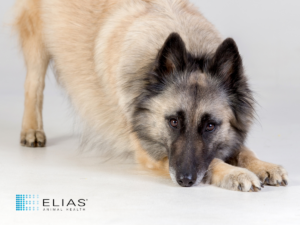 We’re embarking on a 3-part series that explores dog cancer, how our research and progress can be applied to humans, what immunotherapy is, and why it can be so effective.
We’re embarking on a 3-part series that explores dog cancer, how our research and progress can be applied to humans, what immunotherapy is, and why it can be so effective.
“Cancer is the leading cause of death in dogs and as a rank order, higher than people…”
– Dr. Doug Thamm
Dogs live in the same environments as humans, exposed to the carcinogens that their owners are. It’s not surprising, then, that one in four dogs is diagnosed with cancer, and it’s the leading cause of death in pets beyond middle age (Veterinary Cancer Society). Dogs experience cancer at rates that are comparable to or exceed those in humans.
Canine cancer has primarily been treated the same way for decades – with chemotherapy. Dr. Carolyn Henry, Dean of the University of Missouri College of Veterinary Medicine, has said she is “frustrated by the fact that we don’t see many new therapies coming out that will really change the lives of our animals that have cancer.”
A Collaborative Approach to Cancer
We founded ELIAS Animal Health to apply the progress that has been made in human cancers to dogs and then to share our research and treatments with our counterparts who treat humans. While all cancers are different, many share similarities. We follow a collaborative, interdisciplinary approach, aligned with the One Health philosophy of the interconnectedness between the health of people, animals and the environment.
While there is research focused on canine cancers, we saw a need to not only study canine cancer but also to develop new therapies that change how it is treated and to ultimately improve quality and length of life. Our goal is to make these therapies readily available in the veterinary marketplace while also supporting their development for humans.
I was recently asked why our first trials focused on osteosarcoma. Prior to founding ELIAS, I worked for a company that was developing immunotherapies to treat humans. Immunotherapy is a type of treatment that stimulates the immune system to fight cancer (the last blog in this series will provide a comprehensive description of immunotherapy – stay tuned). Osteosarcoma is one of the most common and aggressive cancers in dogs (VCS). It’s also a type of cancer that is highly metastatic in dogs. Achieving treatment success in canine osteosarcoma would result in a new treatment that could help dogs and also add significant scientific insight to further improve treatments for many other metastatic cancers in both dogs and humans.
The ELIAS Cancer Immunotherapy (ECI®) offers a new approach to cancer treatment. It combines a personalized cancer vaccination pre-treatment with activated “killer” T cell immunotherapy. It is rewarding to see patients respond well to treatment and to provide dogs and their people with more and higher quality time together.
